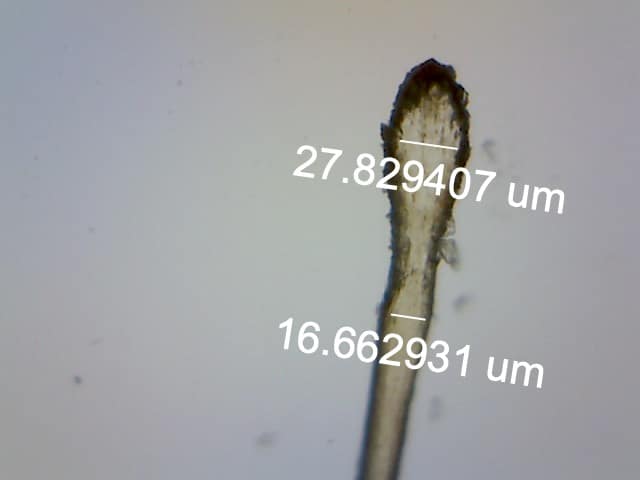What diseases cause hair loss?
Hair loss - whether sudden or more insidious and gradual, whether suffered by a man or a woman - is often resented because it directly affects the image we present to others. And in a world where selfies reign supreme, presenting the best possible appearance is a daily challenge. So when you see your head receding, your temples thinning, in short, when you notice these first signs of alopecia when you look at yourself in the mirror, you're right to be concerned, and it's reasonable to ask whether such symptoms are a sign that you're suffering from a serious illness.
It's true that certain diseases, by causing tissue inflammation, have a negative impact on cell renewal and therefore on the health of the hair shaft, which will renew itself less and less effectively. In this case, your doctor will generally be able to recognise the signs of the disease from the symptoms observed, and prescribe the appropriate treatment.
Yes, solutions exist to treat these pathologies and reduce their impact on the hair in many cases, ... but not in all cases.
5 diseases that cause hair loss
Among the diseases that cause hair loss, the main ones are :
- Alopecia areata. Whether it's partial alopecia or, more spectacularly, universal alopecia. In this case, all the hair follicles are affected and both hair and body hair rapidly fall out without any real warning signs. An autoimmune disease, alopecia is an extreme form of alopecia (hair loss) that is still poorly understood, and scientific research does not agree on the causes: heredity, stress, emotional shock, psychological disorders? Rather a combination of factors. For some, the hair will grow back - completely or not - without any real explanation as to why. For others, the body and/or scalp will remain permanently hairless. Finally, there may be phases of remission of varying duration, which are difficult to anticipate, even for a doctor.
- Diabetes type 1 or type 2. Diabetes can be responsible for hair loss. Studies show that patients suffering from type 1 diabetes - an autoimmune disease - have an increased risk of suffering from alopecia, another autoimmune disease. In the case of type 2 diabetes, where it is insulin regulation that is at fault, the symptoms observed are as follows: the hair becomes brittle, weaker and renews itself more and more slowly, leading to thinning areas on the scalp. According to a recent American study (2016), we could even identify type 2 diabetes by observing the vascular micro-lesions present on the hair follicles, the result of an imbalance in metabolism linked to hyperglycaemia. Other scientists have established a correlation between these hair follicle deficiencies and androgenetic alopecia. Diabetes requires lifelong treatment that must be scrupulously followed.
- Anemia : anaemia or iron deficiency can have a number of health consequences, particularly for women and their hair. It seems that hair follicles are particularly sensitive to iron levels in the blood, iron playing a vital role in the manufacture of haemoglobin, the component responsible for transporting oxygen to our cells to ensure that our bodies function properly. In addition to unusual hair loss, persistent tiredness, lack of energy, brittle nails or excessive paleness, etc. can be symptoms of iron deficiency. Generally, appropriate supplementation (food supplements or medicines prescribed by your GP) and a diet rich in products containing iron of animal or plant origin can remedy the problem after a few months. If the hair continues to fall out and the problems persist despite treatment, other, deeper causes of the alopecia need to be investigated. In our experience, iron deficiency may be an aggravating factor, but it is not a necessary or sufficient cause of hair loss.
- Polycystic ovary syndrome (PCOS) is a hormonal imbalance leading to an overproduction of male hormones, androgens. It is DHT, an enzyme located on androgens, which can have a negative impact on hair follicles - in subjects whose scalp is receptive to their action. Polycystic ovary syndrome can therefore result in androgenetic hair loss, but not necessarily. To find out more => our comprehensive article on androgenetic hair loss in women.
- Tricotillomania : a behavioural disorder that almost exclusively affects women, and young women in particular, trichotillomania is considered to be a chronic mental illness. Trichotillomania consists of compulsively pulling out hair and/or body hair in response to strong emotion or stress. The result: the affected area becomes increasingly sparse because the hair no longer has time to reach maturity, its life cycle is broken prematurely and the hair grows back thinner and more fragile. The only way to control this symptom is to treat it with medication, usually accompanied by long-term psychological support. Hair loss linked to trichotillomania is reversible in most cases, but it is not necessarily possible to regain the hair you had before. In the case of trichotillomania, regaining a full head of hair takes time and care as part of a hair treatment background.
Does tiredness cause hair loss?
Hair is thinning, dull, brittle, limp - in short, it's like us at times: lacking energy, exhausted. reflect our state of health, both physical and moral.
Fatigue and hair loss often go hand in hand apparently.
Why do we lose more hair when we're tired? We often forget this, but hair is a living organ. As such, just like our skin or our vital organs, it will be in tip-top shape if it is properly treated. The nutrients that hair needs to be healthy are transmitted by the bloodstream to the hair follicle, the matrix that generates hair. Without a constant and adequate supply of iron, zinc, vitamins and minerals, hair is dying and it shows!
Temporary fatigue (a few weeks) will not lead to excessive hair loss. Hair growth will be momentarily slowed but the phase of capillary degradation will be too short to have any long-term consequences.
Hair loss will therefore be temporary - if there is no other cause - and easily reversible thanks to a little self-management: a course of vitamins, a balanced diet, a healthier lifestyle and a caring hair routine, and your hair will soon be growing again!
On the other hand, if fatigue sets in for a long time, you need to take action to put an end to this chronic fatigue as quickly as possible. Start by taking a blood sample to assess your ferritin levels : without sufficient intake, the hair will be undernourished and lose all vitality. The solution to combating anaemia and restoring beautiful hair? Target iron-rich foods, take a course of Racines Plus, the Centre Clauderer's vitamin treatment, specially designed to give hair 100 % of its needs daily. An overly restrictive diet resulting in significant weight loss can also lead to deficiencies. If your ferritin level is within the normal range, but the fatigue persists for no apparent reason, consult your doctor to explore other possibilities and find the right treatment.
At Clauderer, we've received numerous reports that Covid has caused massive hair loss. The link between Covid and hair loss has not been proven, despite several scientific studies on the subject. The hair loss experienced after Covid is not in fact a symptom of the disease itself. Rather, it is the severe and prolonged fatigue suffered by Covid patients after high fevers and muscle pains in particular that is the cause of this unusual hair loss.
Can hair loss caused by fatigue be stopped? Fatigue is a warning signal that our body is sending us to say "stop", so let's listen to it!
How can you tell if stress is causing hair loss?
Responsible for lack of energy, lack of sleep and permanent exhaustion, among other things, stress is a factor likely to trigger telogen effluvium hair loss (diffuse hair loss over the entire scalp, not confined to certain areas). Whether it's a one-off event such as an accident, separation, bereavement, etc. or chronic stress, this emotional shock will lead to sudden and rapid hair loss, to the point where you can literally lose handfuls of hair in the space of a few weeks. Hair loss linked to a traumatic episode generally occurs within 3-4 months (cf. how the hair follicle works) after the event.
Good to know: :
hair loss is nothing to worry about
- when the amount of hair lost :
- is greater than the amount usually lost on a daily basis
- extends beyond 6 to 8 weeks
- when the hair that falls out becomes thinner and shorter (renewal is no longer guaranteed)
At Centre Clauderer, our Specialists will be able to identify stress markers in your hair when carrying out your hair diagnosis. In fact, a characteristic thinning forms at the base of the root, preventing the hair from growing properly. The result: thinning keratin. Of course, other aggravating factors can promote keratin degradation, either at the time of hair growth (hereditary factors, deficiencies, etc.) or during cosmetic procedures (straightening). Our specialists can help you understand and, above all, repair the damage caused to your hair.
Example of stress pinch


